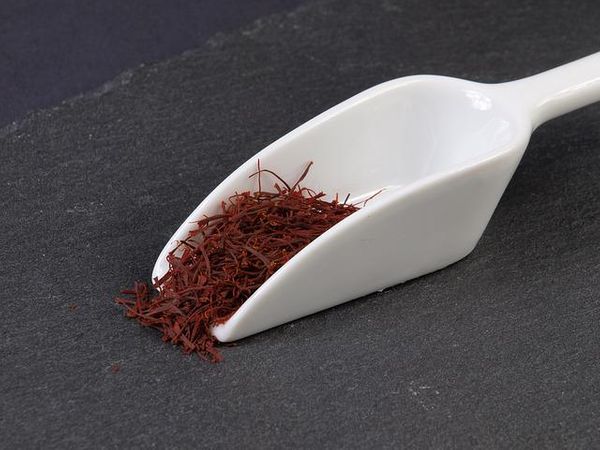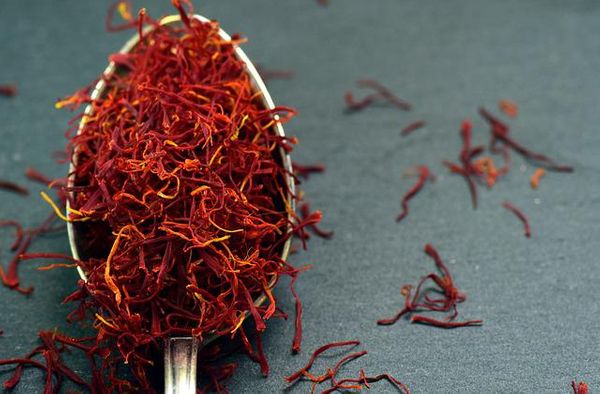Crocus sativus, known as saffron, is a herb that is widely grown around the world, particularly in India. The saffron flower includes a scarlet stigma that resembles a thread; this stigma is dried and used commercially as a spice for its potent aroma as well as for Ayurvedic remedies.
When combined with honey, saffron relieves cough and asthma symptoms. In controlling reproductive system issues including erectile dysfunction in males and menstruation pain in women, it is also helpful.
A particular variety of crocus bloom yields saffron. It frequently appears in Mediterranean cuisine. Saffron is one of the most expensive spices in the world due to its difficult harvesting process; it takes 75,000 blooms to produce one pound of saffron. It has a long history of use as a traditional remedy. Here, let’s check out
Saffron Nutrition and Nutrition Value
Saffron is a rich source of different kinds of nutrients given below

Saffron Nutritional Value per 100g
- Water 11.9 g
- Energy 310 kcal
- Protein 11.4 g
- Total lipid 5.85 g
- Carbohydrate 65.4 g
- Fiber 3.9 g
- Calcium 111 mg
- Iron 11.1 mg
- Potassium 1720 mg
- Sodium 148 mg
- Zinc 1.09 mg
- Copper 0.328 mg
- Manganese 28.4 mg
- Phosphorus 252mg
- Magnesium 264 mg
- Selenium 5.6 µg
- Total saturated 1.59 g
- Total monounsaturated- 0.429 g
- Total polyunsaturated fatty acids- 2.07 g
(Table 1: Nutritional value of saffron per 100 grams) (source)
Vitamins Value
- Vitamin C- 80.8 mg
- Thiamine- 0.115 mg
- Riboflavin- 0.267 mg
- Niacin- 1.46 mg
- Vitamin B6- 1.01 mg
- Folate- 93 µg
- Vitamin A- 530 IU
(Table 2: Vitamins present in saffron per 100 grams2) (source)
Saffron Health Properties, that you Should be Aware of
Saffron is used widely over the world due to the fact that it contains a lot properties that are proven to be remedial. Here we noted down some of the most important properties you should be aware of
- It may heighten feelings of joy and enthusiasm; it might improve memory; it might have anti-inflammatory properties.
- It might assist in lowering blood pressure.
- It might facilitate breathing and aid with digestion.
- It might lessen the effects of aging.
- It could help safeguard the spleen and the liver.
- It might reduce blood cholesterol and safeguard the heart. (source)1,(source)2,(source)3
Health Benefits of Saffron
Saffron Health Benefits: Helps in Controlling Cholesterol Level
Saffron may lower blood cholesterol levels, which may lower atherosclerosis (a condition in which cholesterol gets deposited on the arteries). Saffron has some potential benefits for lowering blood cholesterol levels, but further research is needed to confirm this. As a result, if you have high blood cholesterol, you should contact your doctor for a consultation. Do not use saffron to lower blood cholesterol without first consulting a physician. (source)
Saffron can Treat Various Eye Issues
Saffron can be used to treat a variety of eye issues, including cataracts, corneal disorders, eye pain, and age-related eye ailments. Females lined their eyes with it in the form of “Kohl” as a form of cosmetics to prevent eye infections. Additionally, it might lessen the damage that exposure to light causes to the eye’s photoreceptor cells. To be safe, it is best to visit an eye specialist for any disorders relating to the eyes because they are delicate organs.

(source)
Saffron helps in Treating various Eye Disorders
The alcohol extracts of saffron have shown blood pressure-lowering effects in animal tests. It might be crucial in lowering the risk factors for heart disease, such as the lipids mentioned above. If you or someone you know has high blood pressure, you must rigorously follow the doctor’s instructions and abstain from using any herbs without first consulting a medical professional. (source)
Saffron Benefits in Better Digestion
The digestive system may benefit from the use of saffron. It might aid in reducing gastrointestinal gas production and appetite. It might also aid in the treatment of amoebic dysentery. Although adding saffron to your diet may aid in digestion, it is best to seek medical attention if you are having any digestive problems. (source)

Saffron and Depression
According to research on animals, saffron may elevate mood by lowering the concentration of neurotransmitters in the brain. Its capacity to lessen anxiety and despair has also been researched. Saffron extracts have been shown to improve memory and learning in lab experiments. According to clinical trials, saffron may help dementia patients with Alzheimer’s disease remember things better. These studies, however, don’t go far enough to pinpoint the precise advantages for people. (source)
Additional Saffron Health Benefits
Asthma, chronic bronchial inflammation, the common cold, cough, and other lung illnesses may all be treated with saffron.

Additionally, it might aid in the treatment of rheumatism, an autoimmune disorder marked by inflammation of the joints.
Precautions you should take before using Saffron
If used according to dose recommendations, saffron is usually regarded as safe but keep these things in your mind before consuming it.
Less than 1.5 g of saffron per day is healthy for consumption. 4 However, when taking saffron, the following general safety measures must be observed:
- High doses of saffron (more than 5 g/day) should be avoided by pregnant women since they may result in uterine contractions and abortion.
- Only saffron that has been prescribed by your ayurvedic doctor may be ingested during this time.
- Additionally, one must use caution when providing this pricey spice to elderly and young persons.
Side effects of Using Saffron
Saffron exhibits a variety of side effects in clinical investigations, including dry mouth, anxiousness, numbness, tingling in the hands, headaches, and a feeling of nausea. According to a study, saffron consumption was linked to variations in hunger. However, if you have any negative responses to it, speak with your Ayurvedic doctor who recommended it right away. They’ll be able to handle you properly.(source)
Also Read: What is Arjuna? Uses and Health Benefits of Arjuna





